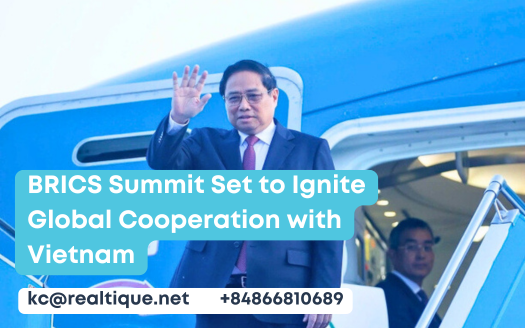BRICS Summit Set to Ignite Global Cooperation with Vietnam
The upcoming BRICS Summit in Kazan, Russia, on October 23-24, 2024, presents a significant opportunity for emerging economies to forge stronger alliances and address mutual challenges. With over 30 leaders from non-member nations expected to participate, the summit aims to enhance collaboration in economic, political, and cultural spheres while promoting a multipolar world. As the focus shifts to collective strategies and partnerships, the implications of this gathering could echo far beyond the immediate outcomes. What specific initiatives might emerge from this crucial event, and how could they redefine global cooperation?
Table of Contents
Overview of the Summit
The BRICS Summit, scheduled for October 23-24, 2024, in Kazan, Russia, serves as an essential platform for strengthening cooperation among its member countries and invited guests.
Hosted by Russian President Vladimir Putin, the summit will gather over 30 leaders from non-member nations, reflecting its significance on the global stage. The agenda emphasizes building a better global community, addressing pressing economic, political, and cultural challenges.
Established in 2009, BRICS has grown to represent over 40% of the global population and approximately 25% of global GDP. This summit aims to promote multilateralism, enhance economic collaboration, and forge stronger cultural ties, thereby reinforcing the collective bargaining power of member states in international affairs.
Frequently attracting a diverse array of leaders, the BRICS Summit in Kazan will feature high-level delegations from member and invited countries.
Among the prominent attendees will be Prime Minister Pham Minh Chinh of Vietnam, leading a delegation that includes Deputy Prime Minister and various ministers responsible for foreign affairs, trade, and security.
Additionally, leaders from Brazil, Russia, India, China, and South Africa, the founding members of BRICS, will participate, alongside representatives from over 30 non-member nations.
This gathering aims to facilitate meaningful dialogue on global cooperation and development.
The presence of such a wide range of leaders highlights the summit’s significance as a platform for addressing pressing global issues and cultivating international partnerships.
Importance of BRICS Nations
Amidst a rapidly changing global environment, the BRICS nations play an essential role in shaping economic and geopolitical interactions.
Representing over 40% of the world’s population and approximately 25% of global GDP, these countries, which include Brazil, Russia, India, China, and South Africa, are crucial in nurturing economic growth and development.
Their collaborative efforts promote a multipolar world, challenging the dominance of traditional power structures and encouraging diverse voices in international discourse.
The expansion of BRICS to include emerging economies further enhances its significance, providing a platform for dialogue on pressing global issues.
This coalition not only amplifies the interests of its members but also serves as a critical conduit for cooperation among developing nations.
Summit Goals and Objectives
With a focus on nurturing global collaboration, the upcoming BRICS Summit in Kazan is set to address several critical goals and objectives.
Central to the agenda is the promotion of multilateralism and the establishment of a multipolar world, aimed at countering unilateralism in global affairs.
The summit will emphasize collaboration on economic development and trade, cultivating partnerships that enhance mutual benefits among member states.
Additionally, pressing global security challenges and geopolitical issues will be examined to strengthen collective responses.
Cultural exchanges and people-to-people connections will also be highlighted, aiming to deepen understanding and cooperation among diverse populations.
Strengthening Vietnam-Russia Ties
The upcoming BRICS Summit presents a significant opportunity for Vietnam to reinforce its strategic partnership with Russia, a relationship that has been nurtured since its establishment in 2012.
Led by Prime Minister Pham Minh Chinh, Vietnam’s delegation aims to deepen cooperation across various sectors, including trade, security, and energy.
The summit will facilitate high-level discussions that can enhance bilateral engagements and address mutual interests.
Both nations share a commitment to multilateralism and geopolitical stability, which positions their partnership as crucial in relation to regional shifts.
Strengthening ties with Russia not only aligns with Vietnam’s foreign policy objectives but also contributes to broader international collaboration, reflecting a shared vision for a more interconnected global community.





